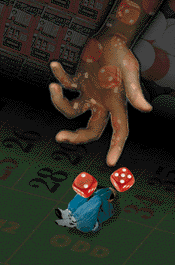
"God doesn't play dice with the universe."
---Albert Einstein---
The novel The Dice Man by Luke Rhinehart, the author (pseudonym of the real author as well) and narrator of the book, is a non sequitur in freewill. It plagued popular imagination for decades and has seen a revival which will probably see the trend going further. It enquires exactly how far man can go in his quest to choose between freewill and determinism.
A question that has profound importance for humanity and has always been asked is: Are we creatures that make our own destiny or does destiny come pre-packaged? Many philosophers and thinkers have struggled in providing an answer to this one. This is because though the terms Chance, Freewill and Determinism can be dissected and understood, the combining of them to give us an answer to the nature of the physical and the intangible universe is quite difficult.
Take, for example, the term Chance. Ordinarily the human tongue would define it as an accidental or unpredictable event, a set of circumstances or probability, an element in happenings that seem to have no assignable cause…and so on. However, there is something about Chance that can’t be dressed up in language and this something is something that has remained elusive for centuries. For Aristotle, chance events were not uncaused but simply the concurrence of two causal sequences. This makes clearer sense when you understand his definition with the illustration of a falling stone hitting a man. The stone falling that happens to hit a man is a chance event but the falling of the stone and the transition of the man are deterministic events, both determined by several factors such as the man’s choice to be passing by the area and the physical state of the stone before falling. It should be noted here that Greek society looked down upon gambling as a silly game for children and old men. Thus, this may be the reason why Aristotle and other Greek intellectuals shied away from the topic and kept to more demanding tasks. Nevertheless, gambling has taken the world by storm and anyone working in a Las Vegas casino could tell you that there is more to the chanceful occupation of venturing into random numbers than meets the eye.
The Dice Man introduces us to Luke Rhinehart who has it all: the beautiful wife, the children, the house, the car, the successful practice as a psychiatrist; everything he was determined to get. Nevertheless, Rhinehart is having a mid-life crisis because he is bored of his picture-perfect life which lacks any redeemable purpose. There are no thrills that he can have because his practice seems to him a useless occupation with diagnosing morbidly self-obsessed patients.
One evening, sitting alone and sinking in his macabre boredom, he rolls a dice to see if he should rape a colleague’s wife. The dice says he should. This momentary release from his individual choice and responsibility fascinates him. He suddenly sees that the dice doesn’t differentiate or operate in human parameters; it is simply engineered by chance. That evening was the foundation of his dice-life.
Rhinehart increasingly participates in dice-living by letting the dice dictate every angle and decision of his life. All he deems himself responsible for is feeding in choices on allotted numbers so that when the rolling of dice would give him one number and hence, one choice. He is very serious about this and makes a pact with the dice to see them to the end and respectfully fulfill any of the decisions the dice make for him. However, this randomization of his life takes him further and further from his family as the dice result in him being perceived as an eccentric or psychotic. His professional life is devoured by the dice and eventually a roll dictates that he should leave his family behind and begin a new life.
Further on in his quest for becoming a random personality, Rhinehart goes into more extremes of rape and murder. His dice-living is no more a secret and some of his former patients and colleagues join him in his randomness, all of them submitting their lives to the die. Rhinehart eventually starts breaking ground as he becomes somewhat of a cult figure and appears on television shows and other media. He runs a Dice institution for like-minded randomness and hosts dice-parties there and establishes various psychological researches on dice-living, such as the ‘Fuck without Fear for Fun and Profit’ program. Despite an excitable and troubling climax, he goes on hand in hand with the dice.
The book became a cultural sensation because of various reasons. The book came with the confident tagline, ‘This book can change your life’, and some readers claim it to be true, stating that the book really did influence their lives. The very idea of submitting yourself and all your important decisions not to some intangible entity but to an off-shoot of the same (Chance) sounds like a juicy temptation. Rhinehart stresses on how a random individual is the only free individual as he is not tied down by anything, both physical and mental. When questioned in the novel by a patient as to how can Chance be trusted as a director, he explains that if tiny details in creation like a blade of grass or a grain of sand cannot escape the detailed supervision of God then surely the roll of dice would be watched by Him as well. This is a decent explanation but one which is handicapped. The problem in becoming random by rolling dice is that though the dice will pick out a random decision from a list, this preceding list was originally prepared by Rhinehart himself and will to some extent, reflect his own choices be it to rape, kill or have sex with strangers. In the words of Spinoza, ‘There is no mind absolute or free will, but the mind is determined for willing this or that by a cause which is determined in its turn by another cause, and this one again by another, and so on to infinity.’ Hence, it is impossible to be completely random but quite possible to be more random then a person is without the dice.
The book is interesting to read because like the choices of the narrator in his life, the choice to write the book itself is also allegedly dictated by the dice. Thus, some chapters are really long and some as short as two or three words. The anti-psychiatry and permissive tone of the book reflects the mood of the 60s and 70s America which was at war with its own values and trying to break free.
A must read for anyone who has an ideal mind and an idle pair of dice. For, though God can't play dice with the universe...you certainly can.
‘How you ever gonna know
What it's like to dance?
How you ever gonna know
If you never take a chance?
---Garth Brooks---

No comments:
Post a Comment